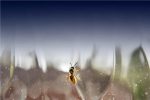
Tap water access in Delhi linked to dengue infection risk reports study
PTI, Feb 12, 2021, 11:59 AM IST

New Delhi: Tap water access in densely populated parts of Delhi is a strong predictor of the risk of contracting dengue, says a study that may lead to new strategies to control the transmission of the deadly virus in urban areas.
The dengue virus is among a growing number of mosquito-borne pathogens across the world that have adapted to spread in cities, the scientists, including Vikram Kumar from the National Institute of Malaria Research in Delhi, noted.
They said close to 3.5 billion people across the world are at risk of dengue viral infection which is spreading increasingly with growing rates of urbanisation.
In the current study, published in the journal PLOS Neglected Tropical Diseases, the scientists analysed social and environmental risk factors for contracting the virus in Delhi.
They measured dengue antibodies in 2,107 individuals and mosquito larval prevalence in 18 areas within the city as well as socio-economic factors across neighbourhoods.
Based on the analysis, the scientists said 7.6 per cent of the surveyed individuals were positive for dengue virus antibodies, indicating a recent or current infection.
The study found that colonies with very poor access to tap water, with less than 61 per cent of houses having access, were associated with a higher risk of exposure to the virus.
According to the research, these were the only type of areas to register dengue cases between epidemics.
However, despite relatively low mosquito densities, they said wealthy colonies had a higher risk of recent infection than intermediary colonies.
The scientists believe this may likely reflect the import of dengue virus by commuters coming into the high-income areas during the day.
Citing the limitations of the research, the scientists said the classifications in the study based on wealth indicators are subjective to an extent.
However, they said these do offer at least some quantitative indication of socio-economic status.
According to the scientists, the use of larval mosquito indices as a measure mosquito density was also a limitation since “they have been shown to have limited predictive value for dengue incidence.”
But the researchers said improved access to tap water could still lead to a reduction in dengue, not only for those directly affected but for the general population.
They believe targeted intervention through mosquito control in winter in the socially disadvantaged areas could offer a rational strategy for optimising control efforts.
Udayavani is now on Telegram. Click here to join our channel and stay updated with the latest news.
Top News
Related Articles More

Have issued unqualified apology for lapses: Ramdev, Balkrishna tell SC

Ensure children up to 12 yrs are allocated seats with their parents in flight: DGCA tells airlines

Thane man held for practising ‘black magic’

Delhi HC: Manohar Parrikar Institute for Defence Studies is Instrumentality of State

Diamonds hidden in noodle packets, gold valued at Rs 6.46 cr seized at Mumbai airport; 4 held
MUST WATCH
Latest Additions

Have issued unqualified apology for lapses: Ramdev, Balkrishna tell SC

Ensure children up to 12 yrs are allocated seats with their parents in flight: DGCA tells airlines

Thane man held for practising ‘black magic’

Not scared of expulsion from BJP, says ex Deputy CM Eshwarappa

Delhi HC: Manohar Parrikar Institute for Defence Studies is Instrumentality of State























